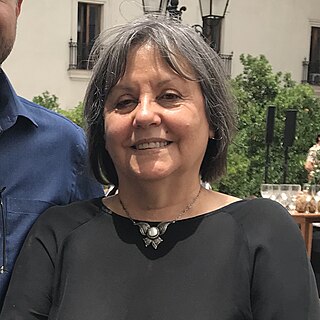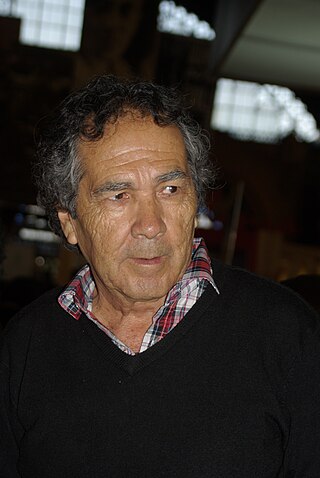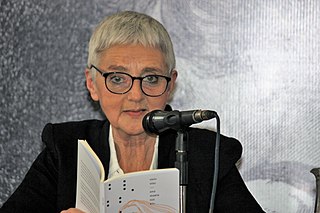
Luisa Valenzuela Levinson is an Argentine post-'Boom' novelist and short story writer. Her writing is characterized by an experimental style which questions hierarchical social structures from a feminist perspective.

José María Merino is a Spanish novelist born in A Coruña, Galicia on 5 March 1941. He is the father of two daughters, María and Ana, both of them university professors. He lived for several years in León and currently lives in Madrid. Best known for his novels and short stories, he is also a poet and a travel writer.

Diamela Eltit is a Chilean writer and university professor. She is a recipient of the National Prize for Literature.

Volodia Teitelboim Volosky was a Chilean Communist politician, lawyer, and author.

Juan Gelman was an Argentine poet. He published more than twenty books of poetry between 1956 and his death in early 2014. He was a naturalized citizen of Mexico, country where he arrived as a political exile of the Military Junta.

Mercedes Valdivieso was a Chilean writer, known since her earliest writings for the subversive nature of her texts. She was born in Santiago, Chile. She first wrote La Brecha (Breakthrough) in 1961, which is considered to be a landmark feminist Latin-American novel. This novel caused dismay from the reactionary segment of society and loud applause from the critics and is considered a revolutionary departure from the traditional treatment of the feminine role in marriage. Breakthrough is a novel that ends with the heroine's awareness that she didn't really need to depend upon a man in order to lead a fulfilling life. The book enjoyed an unexpected publishing success and went through five consecutive editions. Mercedes Valdivieso had the extreme audacity to become an innovator; she bridged the gap between romantic and domestic fiction in a society where women have been viewed as a sexless gender, icons of virtue, and depending on men to meet the necessities of life. Valdivieso also was founder and director of Adan, a men's magazine, and Breakthrough, a feminist publication, she published articles in newspapers and magazines and she gave many lectures and speeches. She taught literature at the University of Peking, at the University of Houston, at Stephen F. Austin State University in Nacogdoches, at University of St. Thomas in Houston and she was a Professor Emeritus at Rice University.

Beatriz Sarlo is an Argentine literary and cultural critic. She was also founding editor of the cultural journal Punto de Vista. She became an Order of Cultural Merit laureate in 2009.

Hernán Rivera Letelier is a Chilean novelist. Until the age of 11 he lived in the Algorta saltpeter mining town, in the north of Chile. When it was closed down, he and his family moved to Antofagasta, where his mother died. His siblings went to live with his aunts. He stayed in Antofagasta, alone, until he was about 11. To survive, he sold newspapers. Later he worked as a messenger for Anglo Lautaro Nirate Company, until his thirst for adventure led him to spend three years traveling in Chile, Bolivia, Perú, Ecuador and Argentina. He returned to Antofagasta in 1973 and began to work at another company, Mantos Blancos. He married a 17-year-old girl when he was 24. Later he left for Pedro de Valdivia, another saltpeter mining town. He completed his seventh and eighth years of study at night school, and at the Inacap educational institute he earned his license as a secondary education instructor. Today he lives in Antofagasta with his wife and four children. He has received the Premio Consejo Nacional de Libro twice, in 1994 and 1996. His novel El arte de la resurrección won the Premio Alfaguara de Novela in Spain in 2010.

Andrea Jeftanovic is a Chilean author, sociologist and academic.
Jorge Guillermo Borges Haslam was an Argentine lawyer, teacher, writer, philosopher and translator. He was also an anarchist and a follower of Herbert Spencer's philosophy of philosophical anarchism. He was Jorge Luis Borges's father.
El Comunista was a daily newspaper published from Antofagasta, Chile. The publication was founded by Luis Emilio Recabarren. It was published between 1916 and 1927. The newspaper was known as El Socialista until 1922. The name change followed the transformation of the Socialist Workers Party into the Communist Party of Chile. José Vega Diaz served as typographer, editor and director of El Socialista. As of 1926 Pedro Caballero was the director of El Comunista.

Federación Obrera de Magallanes was a trade union movement based in Punta Arenas, Chile, active between 1911 and the mid-1920s. FOM was targeted in a deadly arson attack in 1920.

Olga Viktorovna Ulianova Ольга Викторовна Ульянова was a Russian historian, born in the Soviet Union, naturalized Chilean. She specialized in contemporary history, Cold War, Chilean communism and the international non-state networks.

Ana María del Río is a Chilean literature professor, feminist writer, and novelist. Her honors include the Santiago Municipal Literature Award and the María Luisa Bombal Award.
Sofía Sara Hübner Bezanilla, also known as Sara Hübner de Fresno and by her literary pseudonym Magda Sudermann, was a Chilean feminist writer, journalist, and editor.
Elizabeth Subercaseaux Sommerhoff is a Chilean journalist and writer.

Marco Antonio de la Parra is a Chilean psychiatrist, writer, and dramatist. Many of his works, which are strongly influenced by the country's 1973–90 military regime, satirize the national condition through metaphors. He is the author of more than 70 titles translated into several languages, including plays, novels, storybooks, and essays.
Hernán Valdés was a Chilean writer, best known for his book Tejas Verdes, the first published account of the repression carried out by the military dictatorship led by General Augusto Pinochet.
Federico Jeanmaire is an Argentine writer.

Julio Pinto Vallejos is a Chilean historian. He is known in Chile for his study of social history and interpretations of social movements. In 2016 he won the Chilean National History Award. He is a member of the editorial board of LOM Ediciones.














